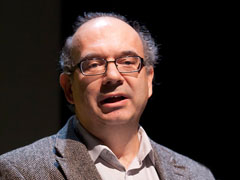The Chilean anthropologist and historian speaks of the importance of public space and supporting it – in physical terms too – following on from the examples of Occupy Wall Street and events in Mexico.
Shared Spaces recorded this conversation with Claudio Lomnitz in January 2012 when he visited the Centre of Contemporary Culture of Barcelona (CCCB) to give the lecture “Dignity” in the “Virtues” cycle (Barcelona Debate 2012). He understands public space not only as a place of open access but also “a space in which there is a certain idea of how it should be used, creatively, respectfully and openly”.
Hence he pays attention to the language being used at the time by the Occupy movement, which called for and demanded the right to occupy public space as a challenge to what he sees as the increasing privatisation of life. This, he warns, could end up meaning that “at a certain point, society becomes defenceless, without even communication, or the contact necessary to think about itself and open up its possibilities”.
He stresses that in order to stop this from happening it is very important that “there should be spaces deliberately created in the city as forums for public discussion”; spaces created as urban planning projects, to be used also as gathering points for citizens and for discussion; spaces he contrasts with those one finds in Mexico where “in the absence of real public space, urban insecurity has led to the trend whereby shopping malls have become the public spaces where the young people meet because they are relatively secure.”
Lomnitz chooses Berlin as his favourite public space because of the fine balance it establishes between history, memory and public space. Berlin was the setting of a great number of the key events of the twentieth century and, he says, it has been able to accept in tangible form its responsibilities and the burden of what happened there.



